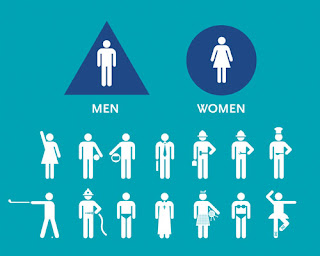 What does it mean to "act like a man"? in our society or what does it mean to be "ladylike"? Do all men act tough, strong, and not cry because they are naturally like that?, Do all woman be gentle, nice, cross their legs and weak because they are born with it? or do they act like that because they were taught in that way?. I'm not going to spend my time doing the nurture verses nature debate,but I just want to clearify one thing that media does stereotype a gender. In all kinds of media including movie, cartoon, magazines, newspaper, and etc the gender is continuously being stereotyped and we could see those effects from all kinds of media that surrounds us.
What does it mean to "act like a man"? in our society or what does it mean to be "ladylike"? Do all men act tough, strong, and not cry because they are naturally like that?, Do all woman be gentle, nice, cross their legs and weak because they are born with it? or do they act like that because they were taught in that way?. I'm not going to spend my time doing the nurture verses nature debate,but I just want to clearify one thing that media does stereotype a gender. In all kinds of media including movie, cartoon, magazines, newspaper, and etc the gender is continuously being stereotyped and we could see those effects from all kinds of media that surrounds us.If you see in all those TV advertisement of household products, cooking utensils which gender is used? Isn't it most likely to be women?. On the other hand If you see advertisement of sports it is most likely to be men. It is not that only women uses house hold products or only men enjoys sports, but why does media shows us in that way? Media just purposely gives those images to our mind. In addition even if you see the famous olden cartoons like mickey mouse, ninja turtles, Flintstones those cartoons portray each gender so differently. male cartoons portrayed as more brave, strong, tough characters than female ones who are represented more as weak, vulnerable, useless characters. We should not forget that cartoons are mostly for kizs or young people, so when young people continues to see those images over time what would they think? Is it media who made us act as men, or women.
http://www.youtube.com/watch?v=0nIXUjzyMe0
On the other hand what make us think that certain behavior is not appropriate for our gender, have you ever done something that you think it isn't appropriate for your gender, for example if you're a guy you know it is not usual to cross your leg while you are sitting, or if if you are a girl you know it is unusual to open your legs wide while you are sitting. Then does people criticize about something that isn't appropriate for your gender? sure they will, even your closest natives like parent would criticize your actions. On the other hand would media criticize? I think this is more obvious answer because they are the main one who does all the gender stereotypes. Likewise because of that some boys or girls would had to hold back the thing that they wanted to do.
Sometimes there are cases where the criteria of gender roles are not followed, where women act strong, sporty and brave and men act weak, sensitive and vulnerable. But as soon as this criteria is not followed the people and media tend to criticize. Gays and Lesbian could be one of big example where criteria of girl should like boys and boys like girls is violated, media itself does not directly critize of them, but clearly they discourage people's opinion toward gay and lesbians. What I personally think is that as sex is not same as gender, it is people own free will to act out their gender. I'm not saying that people can be gays or lesbians if they want to!, but I just think that nothing can be pressured or forced. Even if you are a girl and you're very good at physical skills, it should be your freedom to do something that is related to physical skills, as that area could give more opportunities of success to you. What you do should not only be based on gender.
Baby X is one of big example we learned in class. Where Baby X learned to do both girls and boys roles in school, as we see first time children in school dislike baby X as it was so different from what they've seen. But eventually at the end most children favored X, where the girls started to follow something that boys do and boys started to follow something that girls do. In fact gender stereotype could be just one big boundary that media has created and we have just followed that boundary because it seems right. But we should remember again that everything is a construct and there is no neutral zone. We should be the one to decide what is right and wrong not the media.http://www.youtube.com/watch?v=tq6Ct8IA5cY
